Part II: In Their Own Words – Page 3
Kambiz Nowrouzi | Lawyer
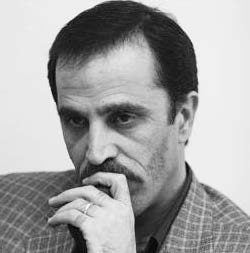 Nowruzi, a lawyer, was the legal secretary of the Iranian Press Association until it was banned in 2009. Security forces detained him outside a mosque on Sunday, 28 June 2009 during the crackdown that followed the disputed 2009 election. Nowruzi spent two weeks in detention and was sentenced by the Revolutionary Court to two years in prison and 76 lashes on charges of “propagating against the regime,” and “disrupting public order.”
Nowruzi, a lawyer, was the legal secretary of the Iranian Press Association until it was banned in 2009. Security forces detained him outside a mosque on Sunday, 28 June 2009 during the crackdown that followed the disputed 2009 election. Nowruzi spent two weeks in detention and was sentenced by the Revolutionary Court to two years in prison and 76 lashes on charges of “propagating against the regime,” and “disrupting public order.”
“Any attack will have no legal justification and it will surely be a transgression.”
“If the United States, by itself or in cooperation with its allies, attacks Iran, we will witness severe and widespread violations of human rights. No doubt all social layers will be harmed by such an action. During wartime, civil, social, and political freedoms will be extremely constrained.”
“The economic structure will fall apart and poverty will become widespread; a crisis of security that will affect everyone. In one word, war will seriously endanger the entire Iranian society.”
Payam D. | Journalist
Payam D. is a prominent Iranian journalist. On numerous occasions, authorities have summoned and interrogated him about articles he wrote in reformist newspapers discussing domestic politics. He has been instrumental in providing support to the families of journalists arrested in the aftermath of the 2009 disputed election. Editors of the publication Payam D. worked for were told after the election that his continued employment would lead to the closure of the newspaper. He was forced to leave his job several months later.
“Even if movements towards [social and political] goals are slowed down and under serious attack, in the instance of a military attack they would come to a complete halt for a very long term.”
“In reality, among Iran’s ruling strata, there is a group that is deeply and wholeheartedly open to the idea of military action against Iran. It is evident that welcoming military action does not stem from their wish for improvement in the civil society or human rights situation in Iran. Rather, military action against Iran from their perspective provides the excuse of an external threat and feeds already existing propaganda that the political opposition is instigated by outside forces. This propaganda is aimed at the lower class that is the logistical backbone of the regime. Thus, using these excuses the government will prepare the grounds for the oppression of political opposition, human rights defenders, and civil society activists.”
Bahman Keshavarz | Lawyer
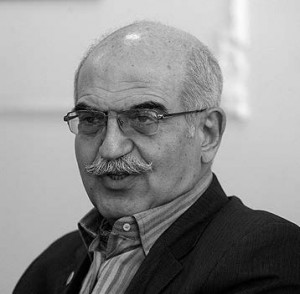 Bahman Keshavarz is a prominent defense lawyer and head of the Iranian Bar Association. He became a household name during the high profile case of Gholamhossein Karbaschi, the former mayor of Tehran. For many Iranians, his defense of Karbaschi remains one of the more memorable events in Iranian legal history. Keshavarz has also authored several books on different legal topics including a legal dictionary and one focusing on commercial law.
Bahman Keshavarz is a prominent defense lawyer and head of the Iranian Bar Association. He became a household name during the high profile case of Gholamhossein Karbaschi, the former mayor of Tehran. For many Iranians, his defense of Karbaschi remains one of the more memorable events in Iranian legal history. Keshavarz has also authored several books on different legal topics including a legal dictionary and one focusing on commercial law.
“Military action, in very rare cases, may be utilized to defend another countries’ security. It requires serious justification that isn’t present in the case of Iran. Thus, any mention of such an attack is irrelevant [under UN standards]. In my opinion discussing a military attack is absurd and baseless, and it would only be discussed by those who have ulterior motives.”
“When we don’t clearly know what the problem is, how can military strike be chosen as a form of prevention? The extent of Iran’s nuclear technology and its use for creation of nuclear weapons and threatening other countries is unclear. The fact that countries have a right to nuclear energy is not a mystery and no one questions it; especially a country that is part of [the NPT] and has permitted inspection of its nuclear activities [by the IAEA]. When no one has been able to prove with certainty Iran’s military use of nuclear technology, how can there be talk about a military strike? There can be no discussions on this topic unless someone just wants to start a war, and that can be done using just about any excuse.”
Kambozia Partovi | Filmmaker
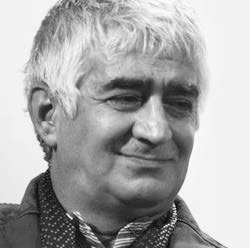 Born in 1955, Partovi is a prominent screenwriter and director. He has written scripts for several famous Iranian films including, “Man, Taraneh, 15 Saal Daram” and “Dishab Babato Didam, Aida.” In 2005, Partovi received the award for Best Script at the Ninth Annual Cinema House Awards for “Café Transit”. Partovi also received the award for Best Script for “Man, Taraneh, 15 Saal Daram” at the 20th Fajr Film Festival. Partovi also authored the Oscar-nominated screenplay for the Iranian film classic “The Circle”, directed by Jafar Panahi.
Born in 1955, Partovi is a prominent screenwriter and director. He has written scripts for several famous Iranian films including, “Man, Taraneh, 15 Saal Daram” and “Dishab Babato Didam, Aida.” In 2005, Partovi received the award for Best Script at the Ninth Annual Cinema House Awards for “Café Transit”. Partovi also received the award for Best Script for “Man, Taraneh, 15 Saal Daram” at the 20th Fajr Film Festival. Partovi also authored the Oscar-nominated screenplay for the Iranian film classic “The Circle”, directed by Jafar Panahi.
“Eight years of war with Iraq showed that nothing positive comes from war. Right now we can see the situation in Iraq and Afghanistan. The ones who are most affected are the people.”
“I think the war with Iraq caused the Islamic state to become stronger than before. The regime used the war excuse and involved all social forces to establish itself. While we defended our country, the regime established itself. I have thought a lot about your question of ‘What would I do if a war breaks out?’ and I think it’s clear that I will defend, because I care about my country and my people.”
“Even so, we must come to a common understanding ourselves [for achieving democracy] and believe in it. We will then find the way for it, like the people of Egypt and other places.”
Pooya E. | Student Activist
Pooya E. is a human rights and student activist responsible for revealing various human rights violations in a number of provinces in Iran. At the time of this writing, he had been summoned to the local Intelligence Office of his town regarding his participation in several student gatherings and interviews with the media. Given the potential consequences of this interview, he agreed to speak with the Campaign on condition of anonymity.
“First and foremost, a military intervention over the nuclear crisis, or any other issue, will undoubtedly have a negative impact on human rights and democracy in Iran.”
“Increasing international discourse on violence and force will translate domestically to a discourse of violence by the government against the people. Whereas enhancing a discourse of negotiations on the international level will result in opening the political space and security inside Iran.”
“Iran’s contemporary social and political history demonstrates that foreign intervention for bringing about a desired environment has never succeeded, and in the long run has produced outcomes to the contrary.”
“Even if we believe in the sincerity of right wing and pro-war elements in the West claiming to support democracy and human rights, we must realize that an attack will not lead to democratic changes. In general, any effect in Iran caused by foreign intervention will not be lasting in terms of leading to democracy or respect for human rights.”
“The economic impact of a war will be most felt by the middle class and the poor. It will weaken respect for human rights and will do much harm to a fragile civil society.”
Ali Abdollahi | Poet
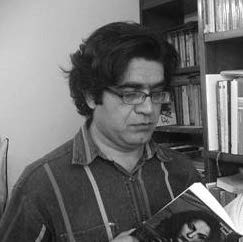 Abdollahi was born in 1968 in Birjand, Khorasan. He is a poet and translator of German literature. He has translated collections of German poets including Nietzsche, Erich Fried, and Martin Heidegger. He has also published three of his own poetry collections including “Hey Raah Miravam dar Taariki.” Abdollahi teaches German and German translation in Azad Universities in Tehran and Isfahan.
Abdollahi was born in 1968 in Birjand, Khorasan. He is a poet and translator of German literature. He has translated collections of German poets including Nietzsche, Erich Fried, and Martin Heidegger. He has also published three of his own poetry collections including “Hey Raah Miravam dar Taariki.” Abdollahi teaches German and German translation in Azad Universities in Tehran and Isfahan.
“I categorically oppose any war. It will destroy the economic and cultural infrastructure and make the situation much worse.”
“The truth is that under the present circumstances, life for writers and artists has been very difficult, but in the case of war it will be much more uncertain.”
Kamran L. | Student Activist
Kamran L. is a former member of the Central Council of Daftar-e Tahkim-e Vahdat (Office for Strengthening Unity), a nationwide student organization. He was arrested following the 2009 presidential election and spent several months in prison. Prior to his arrest, he was considered to be one of the most influential and effective members of the organization’s leadership. Due to his activism, the Ministry of Intelligence barred him from pursuing a graduate degree even though Kamran L. passed the Graduate Entrance Exam. Kamran L. spoke with the Campaign on condition of anonymity.
“A military strike against Iran’s nuclear installations will have negative consequences both in the short and long term. One issue is the resulting environmental and safety disaster. Iran’s nuclear facilities contain radioactive materials and a military attack would result in the release of these dangerous materials throughout the region. The second issue is Iran’s response and retaliation would result in further conflict, instability, and war in the region, and ordinary Iranians will be the main victims of these conditions.”
“A military strike would also likely result in Iran pulling out of the [Non-Proliferation Treaty] and speed up its nuclear program, which could make Iran into another North Korea or Iraq under Saddam, and that would truly be a disaster.”
“The government will considerably intensify its attack on dissidents and attempt to uproot them and this could even expand to targeting those in the diaspora outside of Iran. International security and the human rights of [Iranian] citizens are intertwined and the international community should not separate them. The regime has the potential to carry out a widespread massacre of its citizens.”
“At the point where the threat of Iran having nuclear weapons becomes very serious, or at the point when the Iranian regime commits human rights atrocities within its borders, or exerts negative influence in the region, at that point if all peaceful means to stop Iran fail, then a crippling attack with the permission of the UN and under the supervision of relevant international organizations, as a way to permanently end such problems, may be the last defensible option. However, right now it doesn’t seem, at least from the nuclear weapons perspective, that Iran’s nuclear activities pose an imminent threat. A limited strike will not resolve anything, rather it will start an era of intricate crisis and destruction.”
Nima R. | Author
Nima R. is a journalist with a state-owned national newspaper specializing in social affairs. He has more than 20 years of experience as a reporter and publication manager. Nima R. is one of the few Green Movement supporters that has been able to resist the increasing pressure from authorities to quit his position in state media. Over the past few years, many of his colleagues and friends have been imprisoned or have lost their jobs as a result of political persecution. Authorities also arrested some of his family members during post-election events. He interviewed with the Campaign on condition of anonymity.
“[Today] as soon as newspaper editors and staff start their daily meetings to choose the headlines, a fax arrives from the press officers of the Intelligence Ministry. It outlines the topics allowed to be discussed in detail and those that are off limits. The justification given by them is from a security-minded framework that ‘we should not strengthen the views of enemies and cause uncertainties and in general aid the enemy’s soft-war.’ The newspaper staff has learned to implement such restrictions through self-censorship as well. Now, imagine if a foreign power were to attack Iran, then, with or without reason, any kind of activity by civil society and democracy advocates will come under complete attack and become the perfect excuse for repressing any critical thoughts.”
“Thus, I am of the belief that a war or military intervention would provide an opportunity for the state to finish off all civil society, social and political activists, journalists, academics, students, and [others]. It will certainly give more power to military men to take over the helm of the state, more than before, and to confront democracy advocates even more brazenly.”
Behrouz Gharibpour | Author
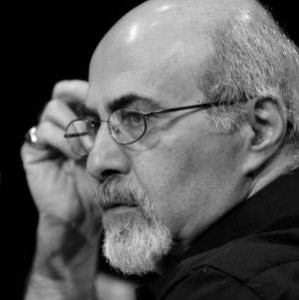 Born in 1959, Gharibpour is an author and director of theater and puppet opera at the House of Artists of Iran and Bahman Cultural Center. In 1997, he was forced to resign as the head of the House of Artists of Iran after Kayhan Newspaper vilified him as an organizer of the velvet revolution. So far he has written numerous plays including, “Rostam and Sohrab Puppet Opera,” “Uncle Tom’s Cabin”, “2342 Bad Days,” and “Qajar-style Puppet Show.” Most of his plays have entered prestigious international theater festivals around the world, such as the Avingon Theater Festival.
Born in 1959, Gharibpour is an author and director of theater and puppet opera at the House of Artists of Iran and Bahman Cultural Center. In 1997, he was forced to resign as the head of the House of Artists of Iran after Kayhan Newspaper vilified him as an organizer of the velvet revolution. So far he has written numerous plays including, “Rostam and Sohrab Puppet Opera,” “Uncle Tom’s Cabin”, “2342 Bad Days,” and “Qajar-style Puppet Show.” Most of his plays have entered prestigious international theater festivals around the world, such as the Avingon Theater Festival.
“I am absolutely opposed to a military strike and foreign intervention. Any foreign power launching a strike will be the main loser because Iranians love their country and even if the conditions are not to our liking, we will not allow any foreign invasion. The United States caused many negative consequences with its support of the 1953 military coup and an attack today would have a lasting negative impact for decades to come.”
“A foreign attack or invasion will not solve any of the problems we face in the cultural domains of theatre and cinema. We have always tried to solve these issues through peaceful means. In my opinion, if any Iranian loves their country, they would seriously oppose an attack, and I belong to this group.”
Alireza Behnam | Poet
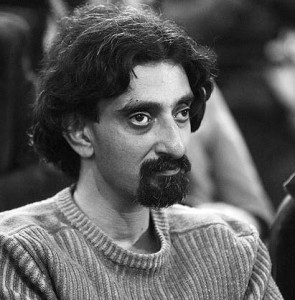 Alireza Behnam is a poet, translator, and a journalist who has worked with the cultural desks of several newspapers and publications since 1993. He currently works at Roozan newspaper. Behnam has published four collections of poems and two translated collections of poetry. His books include “Nim-e Man ast keh Misoozad,” and “Aghrabeh ha dor-e Gerdbad.” In August 2002, he received the Blur Pen Prize for criticism at the International Library of Poetry. In 2008, he was selected as one of three Iranian poets at the Joint Literary Workshop of Iran and Germany held in Berlin.
Alireza Behnam is a poet, translator, and a journalist who has worked with the cultural desks of several newspapers and publications since 1993. He currently works at Roozan newspaper. Behnam has published four collections of poems and two translated collections of poetry. His books include “Nim-e Man ast keh Misoozad,” and “Aghrabeh ha dor-e Gerdbad.” In August 2002, he received the Blur Pen Prize for criticism at the International Library of Poetry. In 2008, he was selected as one of three Iranian poets at the Joint Literary Workshop of Iran and Germany held in Berlin.
“In order to accept a war for bringing about democracy, we must be persuaded that the system has no potential for reform and that civil society activists have no ability to promote or advocate for change. I believe in some countries where the United States has intervened, these conditions were in place and there was no other option than a military attack, but it is not true in the case of Iran. We have not yet explored all of the Constitution’s potentials for ensuring basic freedoms are respected and this can happen by pressures from civil society. Iranian civil society is not yet completely defunct.”
“In my opinion, a foreign military intervention would have very negative consequences and will bring to a halt the gradual and natural movement and development [towards democratization]. It will bring to a halt democratic aspirations within the society. Even discussions of an American military strike will lead to [the government] preventing the activities of intellectuals and civil society activists. It will be the activists who will pay the price for foreign threats. Since the ruling class and traditional segments of society accuse [prodemocracy intellectuals] of having such beliefs that make them supporters of foreigners, with the onset of a war, they will experience the most pressure. I believe, under the present circumstances, it is best to drop any discussions or threats of war.”
Abbas Ghaffari | Actor & Director
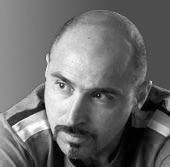 Abbas Ghaffari is a theater director, actor, and critic who has staged plays such as “Khaab-e Bivaghte Houriyeh,” “Aab mara Ghesseh Kard,” and “Najvahaye Shabaneh. Ghaffari has also appeared in several plays including “Kadoo Tanbal”, “Shazdeh Koochooloo”, and “Yek Zan, Yek Mard”.
Abbas Ghaffari is a theater director, actor, and critic who has staged plays such as “Khaab-e Bivaghte Houriyeh,” “Aab mara Ghesseh Kard,” and “Najvahaye Shabaneh. Ghaffari has also appeared in several plays including “Kadoo Tanbal”, “Shazdeh Koochooloo”, and “Yek Zan, Yek Mard”.
“No freedom loving person can support war anywhere in the world. War has always shown it cannot bring about democracy and liberty. During and after a war, the society will become much more closed and move towards destruction.”
“Particularly in the past few years we have seen that the US-led wars in Iraq and Afghanistan have not ushered in democratic societies in these countries.”
“We, in theater, have the fresh experience of the Iran-Iraq war. We saw that during those years, because of the militarization, the cultural space was further closed. I think even if after a war, the environment were to open up, for theater it will not, and will remain closed. We don’t wish to repeat the same bitter experiences.”
Shahram Mokri | Filmmaker
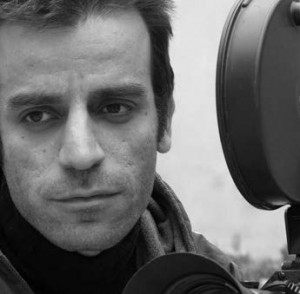 Born in 1977, Shahram Mokri is one of Iran’s most famous short film directors and a screenwriter, film editor, lecturer. Mokri first achieved fame with his short film “Toofan-e Sanjaaghak”. Later, his short film “Mahdood-e Dayereh” won the award for Best Short Film at the 25th Fajr Film Festival. Mokri made his first feature film, “Ashkan, Angoshtar-e Motebarek, va Chand Daastan-e Digar” in 2008, which was met with critical acclaim. He has also lectured at Iran’s Young Cinema Society.
Born in 1977, Shahram Mokri is one of Iran’s most famous short film directors and a screenwriter, film editor, lecturer. Mokri first achieved fame with his short film “Toofan-e Sanjaaghak”. Later, his short film “Mahdood-e Dayereh” won the award for Best Short Film at the 25th Fajr Film Festival. Mokri made his first feature film, “Ashkan, Angoshtar-e Motebarek, va Chand Daastan-e Digar” in 2008, which was met with critical acclaim. He has also lectured at Iran’s Young Cinema Society.
“I was raised in the border city of Kermanshah, and I may have touched war closer than many other Iranians. I have seen how deep and destructive my generation’s fear of war is. My view of war is not a tourist’s view, nor an idealistic one. I didn’t read about war in magazines or watch it in films. I had to take shelter from bombs many times, my school was shut down because of it on many days, and I had a collection of shrapnel and missile pieces in my home. I say touching the war up close is a very terrifying thing, and I don’t wish it repeated.”
“A society is not comprised of only its leaders; a society has different layers such as students, businessmen, city dwellers, etc. I believe the only thing war does is to take the top layer and replace it with another layer. Every society must change from within, and not from the outside.”
Kianoush Ayari | Filmmaker
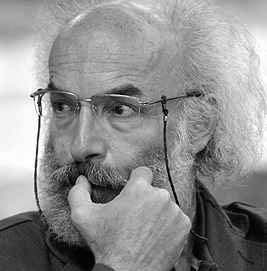 Kianous Ayari is a writer and filmmaker who has won several awards at the Fajr Film Festival. He started his career in 1970 with the Ahvaz Chapter of the Free Cinema Group and made a name for himself in experimental cinema. Ayari’s socially analytic viewpoint has allowed him to portray the lives of people who are lost in different layers of society. His films include “Bidar sho Arezoo,” “Boodan ya Naboodan,” and “Shaakh-e Gaav.”
Kianous Ayari is a writer and filmmaker who has won several awards at the Fajr Film Festival. He started his career in 1970 with the Ahvaz Chapter of the Free Cinema Group and made a name for himself in experimental cinema. Ayari’s socially analytic viewpoint has allowed him to portray the lives of people who are lost in different layers of society. His films include “Bidar sho Arezoo,” “Boodan ya Naboodan,” and “Shaakh-e Gaav.”
“Just like all other people, even if I am facing repression, I cannot be in favor of a war. To be sure, there are those in our country who may be freed of some of their problems if there is a war. But as wars bring with them violence and bloodshed, I am not in favor of them. A war also means interference in the affairs of another country which could have very frightening consequences — bloodshed, repression, insecurity, and a severe drop in quality of life, none of which I favor.”
“We had the experience of eight years of war with Iraq and incidentally, our filmmakers had a very good presence in international circles during the war. The truth is that artists and human beings as a whole try to continue their lives to the extent possible and to cope with their conditions. Coping is a human trait. Artists can work both during times of heavy restrictions and times of relative freedom.”
“The problems imposed upon society during a war will include artists who will have to continue their work under difficult and unfavorable circumstances. I don’t believe the Iranian government wishes a war. Whatever angle you consider, a war is not in the best interest of anyone. Even if some wish to continue their existence through a war, they will not benefit from it as wars are no joke.”
Fathollah Biniaz | Writer
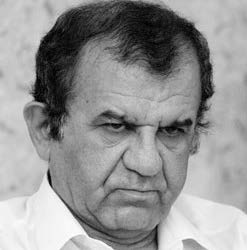 Biniaz is an Iranian writer and literary critic who has published several novels and short story collections, including “Quartet-e Marg o Dokhtar,” and “Molaghat ba Massih”. His literary critique pieces have been published in many newspapers and magazines.
Biniaz is an Iranian writer and literary critic who has published several novels and short story collections, including “Quartet-e Marg o Dokhtar,” and “Molaghat ba Massih”. His literary critique pieces have been published in many newspapers and magazines.
“The people of Iran have created a movement that if it is respected, recognized and supported by the Iranian government, there will be no need for a war; a war with unknown consequences and undetermined extent. The people of Iran are capable of demanding their rights, and perhaps they will even improve in this respect. Therefore, in my opinion, there is no need for foreign intervention. Also, we are neither Iraq nor Afghanistan, and we are not in the same conditions as Libya. Qaddafi warned that he will use tanks to kill his own people; this has not yet happened in Iran.”
“We cannot predict that after a war the situation will get better or worse. War does not have an immediate effect on arts and literature. We cannot say from now that after a war the quality of writing and arts will improve or get worse. However, it could firmly be said that the losses of war will encompass a wide arena and will damage our national interests. Maybe a few military bases will get blown up; however, innocent civilians will suffer and be killed too. For example, in Libya maybe no one is writing novels or book reviews, but that’s because cities are getting bombed left and right.”
Yarali Pourmoghadam | Writer
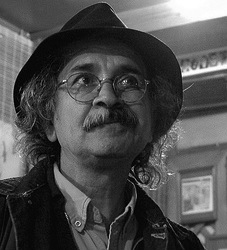 Born in 1950, Pourmoghadam is a playwright, writer, and owner of the famous Shouka Café in Tehran. His café is one of the favorite gathering places for many Iranian artists and intellectuals. He also manages a popular annual photography competition in his café. Pourmoghadam’s published works include “Havaal-e Café Shouka,” “Aah, Esfandiar-e maghmoom,” and “Yaddasht Haye Yek Ghahvehchi.”
Born in 1950, Pourmoghadam is a playwright, writer, and owner of the famous Shouka Café in Tehran. His café is one of the favorite gathering places for many Iranian artists and intellectuals. He also manages a popular annual photography competition in his café. Pourmoghadam’s published works include “Havaal-e Café Shouka,” “Aah, Esfandiar-e maghmoom,” and “Yaddasht Haye Yek Ghahvehchi.”
“I oppose any foreign military strike under all circumstances. Domestic affairs must be addressed by people themselves. Any foreign intervention would lead to unity and opposition to the United States. War would certainly have a very negative impact on the cultural and literary environments and those who work in this milieu. It will make their space much more constrained.”




